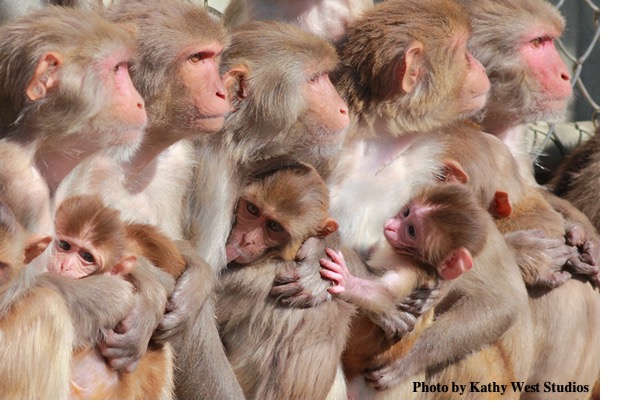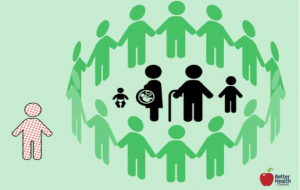It may surprise people to learn that the measles not only affects humans: it also poses a threat to non-human primates. There are many non-human primates currently living in the country for research, rehabilitation, and conservation purposes. With over 4000 monkeys here at the California National Primate Research Center (CNPRC), an infected human person could readily infect our monkey population. As of May 3rd 2019, the total number of reported human cases of the measles in the United States has already doubled that of all cases reported for the entire year of 2018. The Center for Disease Control and Prevention has confirmed 764 individual cases of the measles across 22 states1, including California. The Butte County webpage2 is currently reporting eleven active cases of measles with three more cases in nearby counties.
Although the CNPRC requires all staff, researchers, and visitors to obtain measles vaccination or show proof of immunity, the animals could still be at risk, especially with an outbreak so close to home. The CNPRC experienced a measles outbreak in 1987 consisting of five human cases that resulted in 2600 cases of measles in colony animals. The outbreak cost the center the lives of many animals that could have been saved had an effective measles vaccination program been in place. Following the 1987 outbreak, the CNPRC began vaccinating all of our animals. At the time, the only vaccination protocols for nonhuman primates were based off protocols developed for humans. Unfortunately, these protocols were not cost effective for colony management and primate facilities needed a better option.
For Dr. Kari Christe, a CNPRC veterinarian and JoAnn L. Yee, the technical supervisor for the center’s primate assay laboratory, “current events have shown that the…expense that we have gone to [in order to] vaccinate our animals is justified.” However, knowing how important it was to find a more efficacious vaccination protocol, Christe and Yee, along with their CNPRC team, have worked hard to test the safest and most efficient way to vaccinate the entire CNPRC rhesus macaque monkey colony. They hope their research provides information to help other facilities make an informed decision on how to protect their colony.
Before starting her research in 1996, Christe says “a lot of people weren’t vaccinating their monkeys for measles and I’d already learned how devastating that could be”, in reference to the 1987 outbreak. Many primate facilities did not have the resources to vaccinate their monkeys with current protocols. With the help of the many staff and students, including Gregory Salyards and Serena Houghton, Christe and Yee have shown that it is possible to protect rhesus macaques from the measles in a cost-effective fashion using only half the recommended dose of the measles and canine distemper vaccine (average cost approximately $6) instead of the measles, mumps, and rubella vaccine used in humans3. Their new strategy will save research facilities, zoos, and conservation organizations at least $3 per animal (there are close to 4000 animals at the CNPRC), last time Christe compared prices. Yee hopes the availability of vaccines can help ensure that human diseases don’t transmit into the animal populations.
As in humans, symptoms of the measles in nonhuman primates appear as a distinct rash, high fever, cough, runny nose, and redness in the eyes. Don’t be fooled by the apparent mildness of these flu-like symptoms. Beyond the rash4, the measles can lead to months of immunosuppression following infection. This can leave recovering individuals susceptible to a variety of possibly lethal secondary infections, such as pneumonia. “Measles is one of the most infectious diseases that there is on our planet,” says Christe. “It takes a really large, really dense population to maintain [the virus] … so you need 93-97% of all people to be vaccinated to totally squash measles.”
Christe is referring to something called herd immunity, or herd health. Because the measles can spread5 through direct contact, touching a shared item (e.g. countertops, sink handles, etc.), or through the air, immunity of the entire population is necessary to prevent large outbreaks like the ones currently sweeping across the nation. Individuals with compromised immune systems, like newborns, the elderlyand individuals with autoimmune disorders like lupus, are especially susceptible to the virus during a measles outbreak.
In response to what she hopes the readers learn from this research, Christe wants people to remember “measles is devastating to non-human primates and that…people need to be vaccinated in order to protect the animals. The biggest problem with not vaccinating your monkeys is, if one person gets in and starts an outbreak, you have all these animals that have never been exposed. So that strain of measles, whatever it is, will be devastating because no one is protected. It would [spread] like wild fire.” With safer and more cost-effective vaccine protocols than ever before, we can protect humans and nonhuman primates from the measles.
By Logan Savidge
Email Address: lesavidge@ucdavis.edu
References
- Center for Disease Control and Prevention. (19 April, 2019). Measles Cases and Outbreaks. Retrieved from https://www.cdc.gov/measles/cases-outbreaks.html
- Butte County California. (24 April, 2019). Measles in Butte County. Retrieved from http://www.buttecounty.net/publichealth/measles
- Christie, K., Salyards, G., Houghton, S., Ardeshir, A., & Yee, J. L. (2019). Modified Dose Efficacy Trial of a Canine Distemper-Measles Vaccine for Use in Rhesus Macaques (Mucaca mulatta). Journal of the American Association for laboratory Animal Science, 58, 1-9. DOI: 10.30802/AALAS-JAALAS-18-000091
- Center for Disease Control and Prevention. (5 February, 2018). Complications of Measles. Retrieved from https://www.cdc.gov/measles/about/complications.html
- Center for Disease Control and Prevention. (5 February, 2018). Transmission of Measles. Retrieved from https://www.cdc.gov/measles/about/transmission.html
[Infographic] @BetterHealthGov. (31 August, 2017). Herd immunity protects you & those close to you from the spread of disease. #Vaccinatetoday & stay safe http://ow.ly/PnMd30ePBLy [Twitter Post]. Retrieved from https://twitter.com/BetterHealthGov/status/903502721348550656


